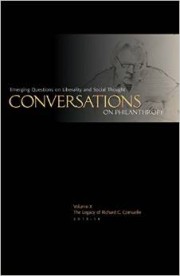Beneficence: Philanthropy in Review, a quarterly newsletter, features book reviews, short articles, and news about The Philanthropic Enterprise. Read Introduction

The Transformation of Philanthropy: Causes, Processes, and Foreseeable Results
Philanthropy is undergoing a classic paradigm shift—a particular kind of historical change, which has a usefully intelligible character and direction. The generic phenomenon was identified by Thomas Kuhn, in The Structure of Scientific Revolutions (Chicago, 1962), and was readily applied in other fields of historical scholarship, especially to describe revolutionary change. More broadly applied, it refers to the total transformation of a mature field of human endeavor—“mature” in the sense of fully and coherently organized in its conceptualization, methodology, technology, and demographics, and fitting into its broader historical milieu, including technology, economy, societal infrastructure, cultural norms, and institutions.

Empowering, Not Enfeebling: Beyond the ‘Market V. State’ Dichotomy
The very core of philanthropy is the desire to do something, and rightly so. But sometimes we need to pull back and let individuals work to form their own associations, based on their own goals and taking advantage of their dispersed knowledge and diverse talents.

By “Simply Staying Possesses All”: Must Freedom and Limits be Opposed?
The beauty of Frost’s meditation on the relationship of freedom and limits is that it reflects how the soul should be disposed toward the Divine.
From the Summer 2014 issue.

Poverty and Politics in Tocqueville’s Memoir on Pauperism
Alexis de Tocqueville's Memoir on Pauperism can help us understand the unintended consequences of apparently benign “solutions” and can help us become more fully aware of the difficulties of solving the problem of need in the modern world.
From the Winter 2014 issue.

Why State-Led Humanitarian Action Fails
Foreign aid intended to alleviate poverty has largely failed and, still worse, in many cases caused additional harms to those who were already suffering.
From the Summer 2013 issue.

Will the ties of community based on mutual need continue to fray thanks to centralized charity (welfare) and the comfort of the coming plenty? Or will abundance lower the costs of each of us to become a superphilanthropist?
From the Spring 2013 issue.

Education for Charity: A Spiritual Visitation
How can we educate for charity? How can we help those we care most about realize their full charitable potential? We might explore the human ascent from the pit of avarice to the heights of charity.
From the Winter 2012 issue.

For the Western pioneers, justice was a concrete action to be taken in specific circumstances, not an abstraction; happiness was a pursuit, not a right; and democratic decisions were a practical more than a political responsibility.

(Twentieth-Century) Philanthropy in America
While Zunz’ book presents an excellent history of the rise of the paradigm which governed twentieth-century philanthropy, it is oblivious to the fallacies which have contributed to its current unraveling.

Adam Smith's ideas are credited by many for the unprecedented growth in wealth and prosperity the West has seen in the over two centuries since his death. They are also blamed by many for inequalities in wealth that have arisen since Smith’s time.
Welcome to Beneficence, the quarterly newsletter of The Philanthropic Enterprise! Available free upon request, Beneficence provides a venue for sharing new insights and reflections on the role of philanthropy in a free society.





